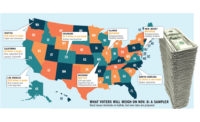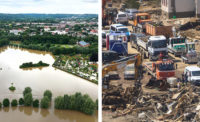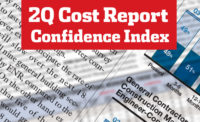Donald Trump’s stunning election as the next American president generated as much surprise across the Atlantic as it did in Democratic strongholds on the East and West coasts of the U.S. But for Europeans, Trump’s triumph was only one more aftershock in a year of seismic political upheaval. It began in June, when U.K. voters narrowly elected to leave the European Union. Meanwhile, smaller nations, such as Bulgaria and Estonia, saw their incumbent governments topple before insurgent campaigns, and Italian Prime Minister Matteo Renzi resigned after his constitutional reforms failed.
France, Germany and Holland all face elections in 2017. German Chancellor Angela Merkel is seen in some quarters as the last leader holding the line for free-trading liberal democracy, multilateralism and the erstwhile establishment consensus. Germany’s open-door policy toward Syrian refugees and the December terrorist truck attack in Berlin have undercut her reelection campaign. France and Holland are bracing for serious challenges from far-right candidates: Marine le Pen in France and Geert Wilders in the Netherlands.
“Is it a film? A reality show? A dream?” asked Germany's Der Spiegel the morning after Trump’s win in November. The publication noted that one of Trump’s campaign planks includes a large infrastructure program, expected to trigger a construction boom, though specifics have been lacking. Bloomberg television quoted Siemens Chief Executive Joe Kaeser, who stated, “We must see what we can do together. Let’s proceed positively.” The Siemens CEO said the U.S. is the firm's biggest market.
A week later, German real estate news organization Immobilien Zeitung picked up the theme, observing that construction companies must be pleased with Trump’s infrastructure investment plans and wryly adding that DAX-listed firms could supply the concrete for his border wall with Mexico. DAX is the Frankfurt stock index of 30 blue-chip German firms. Project and engineering giant HOCHTIEF, based in Essen, saw its stock price rise 8% the day after the election. The company declined to elaborate on the spike. “It’s impossible to communicate regarding the questions you’re asking as the answers could have a possible impact on our share price,” HOCHTIEF spokesman Martin Bommersheim told ENR.
Likewise, other European firms—Skanska in Sweden, VINCI and Bouygues in France, and Salini Impregilo in Italy, among others—all declined to comment on what a Trump presidency will mean to their respective companies.
Kypros Pilakoutas, a professor of construction engineering, a structural concrete expert at the University of Sheffield, England, and an entrepreneur, noted that, for the most part, the large engineering and construction multinationals base their long-term planning on large, government-funded projects.
“You might expect companies in times of uncertainty to start planning for higher risks or even downsize. European politicians would normally behave in the same manner—that is, [to] be financially cautious,” Pilakoutas says. “I somehow doubt that they will … stay cautious for long. I suspect that they will try and deal with uncertainty and instability with positive financial stimuli, such as investing in public infrastructure projects. It is a more difficult option to do a U-turn on overall austerity.” That may come later, he says, adding, “Some large construction companies, especially the more optimistic ones, will think this way.”
While Europe wait to see what will come from the Brexit vote in the way of E&C work, there have been promising signs. For example, a few weeks before the U.S. election, BBC Radio Four’s "Briefing Room" highlighted construction issues, broadcasting a show titled "Infrastructure: The Roads to Recovery?" Michelle Baddeley, professor of economics and finance at University College London and a behavioral economist, pointed out that the U.K. is No. 24 in the world in terms of the quality of its infrastructure. “U.K. productivity is flagging because there is insufficient investment in infrastructure," she said. "Roads, railways. Flood defenses. Airport capacity. Power stations. Waste facilities. Broadband networks.”
There seems to be some momentum behind large-scale infrastructure investments. For example, British Prime Minister Theresa May's administration recently came to a deal over the Hinkley Point nuclear plant and over Nissan investment in the U.K. But uncertainty remains on both sides of the Atlantic. Economic and political volatility seems assured for the near future. While Immobilien Zeitung may think an infrastructure boom is in the offing, Bankhaus Lampe analyst Marc Gabriel notes that outgoing President Obama also declared for infrastructure investment and that it took two years for something to happen.
Organization for Economic Cooperation and Development (OECD) economists show a rosier outlook, however. Speaking to the Huffington Post’s Lennart Pfahler about the forecast, Bergischen Universität Wuppertal economist Paul Welfens says the U.S. economy is going to expand if Trump pushes through major infrastructure spending and corporate tax-cutting. “Construction companies from Canada, Germany, France and Great Britain will be among the big winners because they have experience with public-private partnerships in infrastructure. On the whole, these countries will also benefit from an upswing in the U.S. economy.”
Forecasters and pollsters in the U.K., the U.S. and Italy were confounded by the ups and downs of 2016, says Gordon Masterton, future infrastructure chair at the University of Edinburgh and project representative on the ₤15-billion London Crossrail project. Big corporations now find themselves in an uncomfortable world of heightened uncertainty. “The larger the organization, the greater the need to have confidence in planning, not least to satisfy Wall Street and the stock exchanges that their strategies are robust enough to cope with the unexpected,” Masterton says. “On the other hand, some smaller organizations may see opportunities arising from the new uncertainties. Those bold enough may be able to capture market share.”
Masterton says successful businesses can cope with external change, but it can be a severe stress test if that change comes all at once. “Those with operations in the U.K., the U.S. and Italy must be overloading their corporate strategists right now,” he says. Continuing uncertainty means many businesses may be adopting a wait-and-see approach. Under the so-called "hard Brexit" scenario, trading arrangements between the U.K. and the rest of Europe will be significantly more complex and the free movement of skilled people constrained. “Europe will also be watching carefully for signals from the emerging Trump administration on any change to the prevailing trading conditions. It can't be easy to second-guess what that might look like.”
Masterton says that U.S. construction companies seem to be cautiously confident that promises of increased spending on infrastructure will flow through into contracts.
“A prudent forecaster for the next five years' look-ahead would be waiting for evidence of this in the first 100 days or so,” he adds. “One change that appears to be common across all the outcomes—one that has caught out the conventional forecasters—is an increasing distrust of incumbent politicians,” Masterton observes. “Change for the sake of change has prevailed. This has added to the uncertainty. It'll be tough to strategize with confidence for the next five years. Companies need to build that into their risk-profiling."




Post a comment to this article
Report Abusive Comment